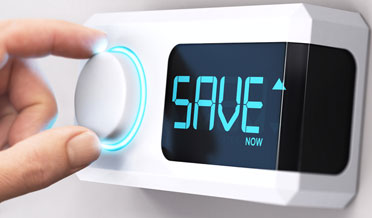Energy-Efficient Commercial HVAC
Management of commercial property, whether as an administrator or an owner, is always tough. Making decisions concerning the maintenance of the HVAC system is a rather troubling aspect of management as well. If you pay the cost of maintenance, it cuts into profit. If you do not pay for maintenance, the higher utility bills and the capital expense of replacing the system also cuts into profits. Here are five considerations that can help you make better decisions concerning a more Energy-Efficient Commercial HVAC.
Programmable Thermostat(s)
The thermostat is the switch for your HVAC system; it calls for heat or cooling through temperature sensors placed strategically throughout the facility. Older model analog systems were simply wall-mounted dials, with a selection indicator on the face. New thermostats are available that have options that should be of interest to management:
- Thermostats are available that work via Wi-Fi. While the sensor remains in key locations, the control portion is accessed remotely by management, not by guests or staff with changing preferences.
- The thermostat can schedule temperature changes to keep people comfortable but also save money. No more wondering whether the AC was changed overnight when the building is empty or if the staff will arrive at a comfortable workspace in the morning.
- How can a thermostat save money? Whether heating or cooling, if the schedule can reduce the demand by 80 F for at least 8 hours daily, the estimated utility saving is 10%. Saving money must be intentional, but it is possible.
- If your facility is spread out or multi-storied, the thermostats can be tied together for greater savings.
Scheduled Maintenance
The importance of regular preventative maintenance cannot be overstated and its important to have an Energy-Efficient Commercial HVAC system. If the furnace fails in a commercial facility, commerce stops until the furnace is repaired.
- Some applications will have a variety of heating and cooling components spread out on several floors or across thousands of square feet. The training and tools required to maintain the various heating and cooling technologies are not in normal toolboxes; proper maintenance requires professional care.
- Preventative maintenance includes a lot of inspection and cleaning. The various coils, drains, elements, and connections will be cleaned. The electrical connections, controllers, sensors, and switches will be inspected and tested for proper function. Larger components will receive the same care. Belts will be checked and replaced as needed. A few moving parts may need to be lubricated.
- Completing these steps on a regular basis ensures the HVAC system functions with close to its original energy efficiency. If a problem does develop, it is discovered early before a small problem becomes a large problem.
Economizer Technology
Facilities that require 4 ½ ton air conditioners and larger are required to employ an economizing damper. Commercial buildings call for air conditioning earlier than residential applications. Economizers measure the outdoor temperature and draw outdoor air inside to replace or augment it as a cost-saving measure. Economizers have welcomed additions to commercial air conditioning systems, but they will require professional maintenance.
Ductwork Care
Another essential component of your HVAC system that needs care is the network of ducts that connect every space in the facility.
- As air moves through the network of ducts, dust, pollen, and other airborne particles are carried along for the ride. When the cycle ends, some of those particles are deposited on the duct walls. It is recommended that commercial ducts be cleaned every 3 to 5 years.
- The sheet metal ducts are constantly expanding and contracting with each heating or cooling cycle. This constant movement can lead to the development of cracks and gaps. The ducts need to be inspected during the cleaning process.
Replacement Plan
Nothing lasts forever, and it is certainly true for HVAC systems. An average commercial HVAC system will serve efficiently for 15 to 20 years; maintenance helps determine how long the system lasts. This gives you time to budget for and schedule an appropriate replacement event. Talk with your HVAC professional about components or complete replacements.
Want a more Energy-Efficient Commercial HVAC System?
Let us help your business to obtain a more Energy-Efficient Commercial HVAC. Call Doctor Cool & Professor Heat today at 281-338-8751 or email Doctor Cool and let our professional Residential HVAC Replacement technicians assist with all of your AC Tune Up questions.

